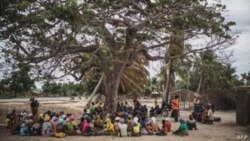Regional powers in southern Africa could play an important role in helping Mozambique combat a growing Islamist insurgency in the northern part of the country, experts say.
The violence in Mozambique was discussed last week when southern African regional leaders met for a virtual summit of the Southern African Development Community (SADC), a 16-member bloc that aims to further political, economic and security cooperation among south African countries.
The meeting came days after Islamic State-affiliated militants took control of a strategic port in the restive province of Cabo Delgado.
In its most recent communique, SADC expressed its “solidarity and commitment to support Mozambique in addressing the terrorism and violent attacks and condemned all acts of terrorism and armed attacks.”
During the summit, Mozambican President Filipe Nyusi assumed the chairmanship of the regional bloc, which experts say could be “an opportunity for a better coordinated regional response to the Cabo Delgado crisis.”
Alex Vines, director of the Africa program at Chatham House, says there is growing regional concern about the Cabo Delgado crisis but little appetite from Mozambique or its neighbors for formal external intervention.
“The reality is that Cabo Delgado is much more an East African regional problem than a southern Africa one,” he told VOA, adding that, “Tanzania especially can assist in lesson and intelligence sharing and disrupting supply lines to the insurgents from East Africa and beyond.”
Tanzania, which borders Cabo Delgado to the north, has deployed troops to the border to prevent a spillover of the unfolding violence in the northern Mozambican province.
High expectations
In May, leaders of Zambia, Botswana, Zimbabwe and Mozambique met in the Zimbabwean capital, Harare, under the banner of the SADC’s security committee. The meeting largely focused on the security situation in northern Mozambique.
At the time, the leaders pledged to provide support to Mozambique to increase its counterinsurgency efforts in Cabo Delgado.
Experts say people in Mozambique have had high expectations of SADC, but the bloc has been slow to come up with a practical response for the insurgency in Cabo Delgado.
“From May until August, not much has happened,” said Adriano Nuvunga, executive director at the Center for Democracy and Development in Mozambique. “Insurgents have gained confidence, capacity, more coordination, and they have been bolder in their actions.”
He told VOA as the situation continues to deteriorate in northern Mozambique, “one expects quick actions” from regional powers, but since that hasn’t been the case, “those high expectations seem to be waning.”
But for Mozambique, “having taken over the chairmanship of SADC would show the extent to which the government will use that platform to mobilize support in its actions against the insurgency in Cabo Delgado,” Nuvunga added.
Private military companies
Mozambican authorities have relied on private military companies from South Africa and Russia to assist in providing security in the Cabo Delgado region, where several foreign oil and gas firms, such as ExxonMobil and Total, have investment projects.
Experts say while some units of the Mozambican military are better motivated and disciplined than others, government forces in general are demoralized and fragmented with competition, particularly between the military and the police.
“There has been a number of niche offers made and an acceptance that Mozambique needed to contract the Private Military Company (PMC) … to assist its counterinsurgency efforts,” Vines of Chatham House said.
“PMC engagement is not a long-term option; better training of government forces, consistent supply lines and much better command and control and intelligence gathering is required,” Vines added.
Emilia Columbo, a senior researcher at the Center for Strategic and International Studies in Washington, says even private military companies have had difficulties in coordination with Mozambican security forces in the fight against the insurgents.
“To the extent PMC-supported operations have been successful in pushing back insurgents, we have seen them adapt, regroup, and strike again,” she told VOA, adding that, “It is important to note that even as the PMCs operate in Cabo Delgado, the insurgency has grown in capability and sophistication.”
Who are the militants?
Since the outbreak of the insurgency in northern Mozambique in 2017, militant attacks on civilians and government security forces have killed more than 1,000 people and displaced more than 210,000 others, according to the United Nations.
Locally known as al-Shabab, Ahlu Sunna wa Jama is the main militant group responsible for these attacks in northern Mozambique. It is considered to be the Mozambique affiliate of the Islamic State terror group.
In April 2019, IS declared its so-called Central African Province, known as ISCAP. Attacks attributed to its Central African Province affiliate have been limited to Mozambique and the Democratic Republic of the Congo.
Mozambican officials and experts believe foreign fighters play a major role in the insurgency in northern Mozambique.
In a recent conversation with David Malpass, president of the World Bank, Mozambican President Nyusi said there is evidence that foreign militants have been training local insurgents in Cabo Delgado.
“In this terror threat, we have signs of involvement of foreigners who are recruiting and training local youth, and also be equipping them, because we don’t know how they get their equipment,” Nyusi said during a virtual meeting with Malpass.
Analyst Nuvunga said the knowledge the insurgents have shown about the geography of the area and the way they have engaged with the local population suggest that they are from the area.
“They are local young people who were mobilized and instrumentalized by certain interests to wreak all this havoc,” he said.
Nuvunga said “the masterminds and leaders who I believe are behind all of this instrumentalization” haven’t yet been identified.





